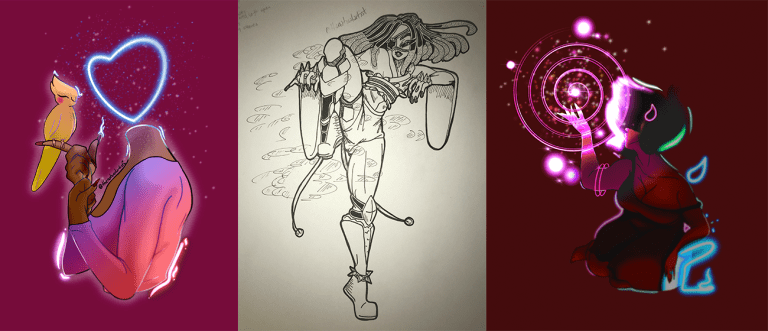Finding strength in connections and power in seeking advice
[Mount Holyoke] truly made me feel like I was part of the community.
At age six, Aiesha Thomas discovered art, doodling in notebooks and creating stories. As she got older, art became a source of therapy and an integral part of her life.
“You wouldn’t catch me without a sketchbook and a pencil in my hand,” Thomas says. “I always had something to draw on.”
Thomas, who went to a high school that encouraged its students to apply to colleges far and wide, had already been accepted to 30 other colleges when she applied to Mount Holyoke— none of the schools that accepted her felt quite right.
Thomas’s guidance counselor at Democracy Prep charter school had impressed upon her the importance of how a campus felt viscerally, so she focused on her ability to feel safe. Having visited Mount Holyoke several times over her high school career, Thomas realized that Mount Holyoke fit the bill.
“My school had conducted many college trips over my four years there,” she explained. “[Mount Holyoke] truly made me feel like I was part of the community. It is also very serious when it comes to mental health, and I really needed that.”
When the news came that she had been accepted to Mount Holyoke, she was excited because of the illustrious history associated with the Seven Sister schools. “I was like, ‘Oh, wow, one of the sister schools really wants me. This is huge,’” she said.
Although Thomas has always relied on art as a refuge from her environment, it wasn’t in her sights as a potential major. But as she approached her second year in college, she knew she had to make a choice. She decided to commit to the subject that she had always loved and began to explore media outside of the paper and pencil that had been her sole focus until then.
Thomas developed her natural gifts in art by taking visual exploration, casting/installation, printmaking and studio sculpture classes. She credits her advisor, Ligia Bouton, for helping her make the transition from a high school student, who merely focused on her grade, to a more developed student who sees the beauty in the process of making art.

“I came in at the same time Ligia started here,” she said. “I feel like I grew up with her. I go to her for everything,” she said. “She doesn’t talk to me as a professor; she talks to me as a mom. If I’m freaking out, she reminds me that I have the whole semester. She’s like, ‘I just want to see the progress, that you’re actually putting your mind to it. And I know what you’re going through. It’s okay; I got you. I’m here for you.’”
Thomas considers herself to be a late bloomer who had learned early to be self-reliant. At Mount Holyoke, she learned to find strength in connections and power in seeking advice.
She credits her professors at Mount Holyoke with helping her to develop the networking skills she uses both on and off campus.
“I don’t think I’ve ever been told no when asking for help from my professors,” she says. “And in doing so, I learned how to communicate better with people.”
Another lesson Thomas learned at Mount Holyoke was the important life skill of slowing down from the grind. Being from New York City, a place where the hustle is as nonstop as the subway, Thomas experienced a bit of culture shock when she learned that time was valued differently, and self-care was equally valued as an accomplishment.
“It was like, wow, people really value going home and spending time with their families,” Thomas says. “The corporation does not need you that badly. Your body needs you more. You got to take time to take care of yourself. That’s not really something I learned in the city.”
Thomas is excited at the prospect of building her résumé and will be taking the life lessons she learned at Mount Holyoke when she returns home to the Bronx after she graduates. Currently, she is looking for a position in studio art or art history and is still creating her art.